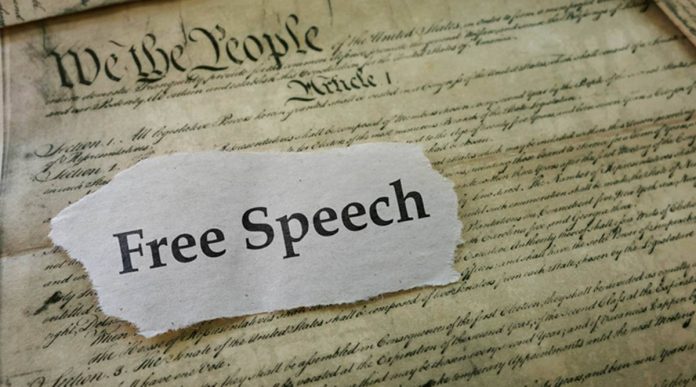This article is written by Shailja, pursuing an Introductory Course: Legal Writing For Blogging, Paid Internships, Knowledge Management, Research and Editing Jobs from LawSikho. The article has been edited by Aatima Bhatia (Associate, LawSikho) and Ruchika Mohapatra(Associate, LawSikho).
Table of Contents
Introduction
The idea of freedom of speech in India has been enshrined in its Constitution under Article 19(1) but its legacy goes back to the freedom struggle when the leaders believed in forming a nation where every citizen has a right to free speech. But this right to freedom of speech and expression isn’t absolute. It is subjected to few reasonable restrictions under Article 19(2) of the Constitution, one such being public order. Public order refers to the conditions where people behave in a sensible and rational manner and at the same time respect each other. However, often we come across instances where the line between an individual’s right to freedom of speech and disturbance in public order becomes a question of debate. Recently, such debates and questions have been raised in numerous instances which include the Dabur ad controversy, FabIndia ad, and many others where free speech clashes with public intolerance. This article aims to discuss the aforementioned question of debate and explore the relation between free speech and public intolerance.
Recent controversies
A lesbian couple celebrating a Hindu ritual named karva chauth in an ad by Dabur’s fairness bleach brand ‘Fem’ sparked a massive controversy. While a certain section of the society supported the progressive agenda behind this ad, another group of people attacked the ad for being offensive. The brand was even threatened by Madhya Pradesh Home Minister Narottam Mishra with legal actions and ultimately the ad was taken down. Another brand that received a backlash from the public was FabIndia for releasing a Diwali themed clothing collection and naming it as Jashn-e-Riwaaz. Soon the backlash turned into a Twitter trend as #boycottFabIndia as the ad was considered to be ‘culturally inappropriate’ and was alleged to be unnecessarily mixing the two separate religions together.
While there have been many such controversies where advertising companies have faced public backlash but instances of intolerance are not only limited to them. Another recent and quite famous case of intolerance was against Salman Khurshid’s recent book ‘Sunrise over Ayodhya: Nationhood In our Times’ for comparing Hindutva to jihadist Islam of terror groups like ISIS and Boko Haram. A petition to ban the book was filed before the Delhi High Court, claiming it to be hurting the sentiments of the people. However, the High Court rejected the petition stating that” if sentiments are hurt, read something better.” The intolerance intensified to such an extent that Salman Khurshid’s home at Nainital was arsoned.
Such instances are not new. The exercise of the right to freedom of speech, time and again hurts the sentiments of another person or a class of persons, though at times it is based on reasonable grounds, and other times it is hard to define what that reasonable basis is. In all the above-mentioned cases of public intolerance, severe backlash from the public has acted as a restraint on someone else’s freedom of speech and creativity. Such backlashes undermine creative freedom in India and create a situation where advertising agencies, writers, etc. have to restrict themselves within a certain boundary out of the fear of hurting someone’s sentiment which most of the time also limits the free flow of progressive ideas and thoughts in society. The growing intolerance in the society not only obstructs free speech but also acts as a hindrance to the breaking of the status quo mentality and thus limits the society from growing towards being a better one.
Now the question arises as to what causes such extreme intolerance in society? Can’t there be harmonious co-existence of diverse ideas and thoughts in a given society? How can we become more tolerant and respect everyone’s right to freedom of speech and expression? Let us explore these questions in the following section.
Harmonious coexistence of ideas
Psychologists define intolerance as generalised negativity or antipathy towards a group of people that is different from oneself in various respects, often because of feelings of threat to one’s beliefs. It is referred to as unwillingness to accept views that are different from one person to another. According to them, there can be three forms of intolerance- one being prejudicial intolerance which is based on having a rigid mindset towards something or someone, second, being intuitive intolerance which is based on non-reflective response and third being the deliberative intolerance which involves interfering with certain practices that violate moral principles. Here, we are talking of prejudicial intolerance which is the most prevalent form of intolerance in India. One of the factors that lead to massive backlash is religion. Communal disharmony has frequently been a point of issue that has stirred intolerance among people. This communal disharmony often stems from the belief that one’s religion is superior to others. This can also take the form of majoritarianism, which poses a grave threat to the freedom of speech in India.
Often, in a society that comprises a diverse set of beliefs and ideologies as well as different religions, conflicts of opinion are bound to arise. However, the problems arise when such conflicts of opinion take the form of rivalry between the majority and minority forces which gradually intensify if not controlled at the right time. These conflicts of opinion are also reinforced due to the support of the political leaders by their rhetoric and speeches who intend to take advantage of the divide to gather more votes for themselves. In such a society that holds rigid views and ideologies, any speech or opinion or thought that differs from them can act as an offensive speech for others and hurt their sentiments thereby obstructing the free flow of ideas and thoughts.
However, the underlying assumption behind such a person’s sentiment is the belief that the differing views are a threat to their rigidly held opinion or belief. They believe that anyone who expresses an opinion that is slightly progressive than their own opinion or ideas is threatening them. Therefore, instead of taking it as a personal threat, such progressive thoughts or opinions should be taken in a much more optimistic manner where ideas are in conflict with each other and not the people exhibiting such ideas. In other words, to grow more tolerant of differing views, such views should be separated from the individual who holds those views. This approach can act as a way of harmonious co-existence of ideas and thoughts that are different from one another.
Another assumption is that one’s freedom of speech is superior to others which often makes people believe that their point of view is better than others. This belief makes the person feel entitled to attack another’s opinion or another’s right to freedom of speech and expression. While it might take time to inculcate harmonious co-existence of ideas within a society, it becomes all the more essential to take efforts to protect the freedom of speech of an individual in the midst of growing intolerance in the society. Here, the judiciary, as well as the executive, becomes an important instrument of protecting an individual’s right to free speech.
Conclusion
Freedom of speech and expression in a country ensures that every individual expresses his/her opinion without any fear of resistance, though it should be to such an extent that it doesn’t restrict another person’s right to free speech. For a country to evolve and grow in terms of its ideologies and mindsets, it needs to enable the free flow of different voices and opinions. In order to break through the status quo and progress as a society, every citizen must feel free to voice their opinion. However, with the growing intolerance in society, freedom of speech has come under a grave threat. People resort to extreme actions and violence against anything that differs from their point of view. Such a violent way of expressing dissent threatens liberty and freedom of the citizen which further divides the society into different sections who are intolerant to each other. Due to such a situation arising within the country, we as citizens get further separated from progress and development and get shifted towards countering each other, trying to establish the supremacy of one’s point of view over others.
What we really require is to allow different opinions to coexist with each other and inculcate respect for everyone’s fundamental right to free speech. In order to transform with the changing times, we as a society must learn to be tolerant of the views of other people. Expressing disagreements and agreements towards something in a healthy and lawful manner is an effective way of bringing in transformation in the society but the only thing that bridges the gap between these two is creating an ambience of freedom of speech which gives the people the power to use their voice for a better cause. A society intolerant towards differing views restricts the people from using this power which is also a threat to a democratic country.
To sum up, I would like to take the help of a quote by a famous French writer as well as an ardent advocate of freedom of expression-Voltaire who had said, “I disagree with what you say—and will defend to the death your right to say it.”
References
- ‘Where the Mind Is Without Fear: Free Speech in India’, we unlearn.org, https://www.weunlearn.org/blog/free-speech
- ‘Public intolerance’ led to Dabur ad being pulled: Justice D Y Chandrachud,’ IndianExpress https://indianexpress.com/article/india/dabut-karva-chauth-ad-dy-chandrachud-7603064/
- ‘If sentiments are hurt, read something better: Delhi HC on plea seeking ban on Salman Khurshid’s book’, IndiaToday. https://www.indiatoday.in/india/story/supreme-court-dismisses-plea-ban-salman-khurshid-book-hindutva-1880637-2021-11-25
- ‘From FabIndia to Tanishq, a look at brands that faced backlash on social media for their ads’Firstpost. https://www.firstpost.com/india/from-fabindia-to-tanishq-a-look-at-brands-that-faced-backlash-on-social-media-for-their-ads-10086071.html
- ‘Dabur ad controversy: You can either glow with pride or bleach the rainbow’, IndianExpress. https://indianexpress.com/article/entertainment/entertainment-others/dabur-ad-controversy-you-can-either-glow-with-pride-or-bleach-the-rainbow-7599998/
Students of Lawsikho courses regularly produce writing assignments and work on practical exercises as a part of their coursework and develop themselves in real-life practical skills.
LawSikho has created a telegram group for exchanging legal knowledge, referrals, and various opportunities. You can click on this link and join:
https://t.me/joinchat/L9vr7LmS9pJjYTQ9
Follow us on Instagram and subscribe to our YouTube channel for more amazing legal content.
 Serato DJ Crack 2025Serato DJ PRO Crack
Serato DJ Crack 2025Serato DJ PRO Crack











 Allow notifications
Allow notifications


